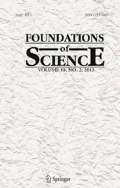Abstract
In my comments, I address two issues that are important but not central to the paper under review here. First, I present a reading of the postphenomenological concept of multistability by going back to Merleau-Ponty’s notion of the primacy of perception. I conclude that assertions affirming the multistability of technologies should not be seen as merely empirical. Second, I address the adequacy of using the language of ‘empirical’ and ‘transcendental’ as a means to categorize exclusionary approaches in philosophy of technology.
Similar content being viewed by others
Notes
If one wanted to give this word a ‘transcendental’ inflection, one could replace it with ‘structure,’ ‘condition’ or ‘schematize.’ Given such an inflection, it appears that postphenomenology could find common cause with Stiegler’s provocative notion that—paraphrasing the author here—technologies provide conditions for the possibility to think anything at all. This possible point of reconciliation is something the author seems to note in passing.
Undoubtedly, Ihde is very familiar with Merleau-Ponty’s work. More importantly, the intertwining of the transcendental and the empirical were always a part of Merleau-Ponty’s philosophic concerns.
I will focus on this essay rather than the Phenomenology of Perception because during this address and subsequent question and answer, many of the philosophers in attendance were not phenomenologists, so Merleau-Ponty was presenting his ideas in a more general philosophic idiom.
As I read it, the Phenomenology of Perception is firmly in the tradition of transcendental analyses. However, it does not seek to discover the conditions of the possibility of any possible experience whatsoever; rather it seeks to uncover the conditions of actual experience. This implies that the conditions can only be discovered in concrete analysis of the conditioned, and perception is the site of our initial contact with being.
It should be emphasized that arguing for the primacy of perception in this way is not a reduction of all truth to perceptual truth: “I have never claimed that perception has a monopoly on truth. What I mean to say is that we find in perception a mode of access to the object which is rediscovered at every level…” (“Primacy of Perception” 34).
“In other words, the synthesis which constitutes the unity of the perceived objects and which gives meaning to the perceptual data is not an intellectual synthesis. Let us say with Husserl that it is a "synthesis of transition" [synthèse de transition]—I anticipate the unseen side of the lamp because I can touch it—or a "horizonal synthesis" [synthèse d'horizon]—the unseen side is given to me as ‘visible from another standpoint,’ at once given but only immanently” (“Primacy of Perception” 15).
The Gestalt theorists had a profound influence on Merleau-Ponty’s thinking throughout his career. In fact, it would be difficult to imagine Merleau-Ponty’s thought without such influence. Here I am merely indicating one such area of influence.
References
Achterhuis, H. (Ed). (2001). American Philosophy of Technology: The Empirical Turn (R. P. Crease, Trans.). Bloomington: Indiana University Press.
Ihde, D. (1990). Technology and the Lifeworld: From Garden to Earth. Bloomington: Indiana University Press.
Ihde, D. (2012). Experimental Phenomenology, Second Edition: Multistabilities. New York: SUNY Press.
Merleau-Ponty, M. (1964). The Primacy of Perception and Other Essays on Phenomenological Psychology, the Philosophy of Art, History and Politics. (J. Eide, Trans.). Evanston: Northwestern University Press.
Verbeek, P. P. (2005). What Things Do: Philosophical Reflections on Technology, Agency, and Design. University Park: Pennsylvania State University Press.
Author information
Authors and Affiliations
Corresponding author
Additional information
Publisher's Note
Springer Nature remains neutral with regard to jurisdictional claims in published maps and institutional affiliations.
Rights and permissions
About this article
Cite this article
Besmer, K.M. On Turning Away from “The Empirical Turn” (But not Necessarily Towards the Transcendental). Found Sci 27, 549–554 (2022). https://doi.org/10.1007/s10699-020-09757-y
Accepted:
Published:
Issue Date:
DOI: https://doi.org/10.1007/s10699-020-09757-y


